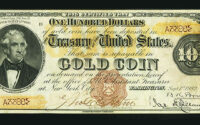You’re Buying the Government? – Miller on the Money
 Trillions for bank bailouts, secret loans, exorbitant inflation, negative interest rates; middle class struggles while the rich get richer….
Trillions for bank bailouts, secret loans, exorbitant inflation, negative interest rates; middle class struggles while the rich get richer….
How did we get into this mess?
Frontline on PBS outlines, “The Long Demise of Glass-Steagall.” (Emphasis mine)
“1933
Following the Great Crash of 1929,…politicians, see market speculation…by banks during the 1920s as a cause of the crash.
In 1933, Senator Carter Glass (D-Va.) and Congressman Henry Steagall (D-Ala.) introduce the historic legislation that bears their name, seeking to limit the conflicts of interest created when commercial banks are permitted to underwrite stocks or bonds. …. The new law bans commercial banks from underwriting securities, forcing banks to choose between being a simple lender or an underwriter (brokerage).
1960s-70s
Beginning in the 1960s,…a lobbying subculture springs up around Glass-Steagall. Some lobbyists even brag about how the bill put their kids through college.
1986-87
Fed begins reinterpreting Glass-Steagall. …. The Federal Reserve Board votes 3-2 in favor of easing regulations under Glass-Steagall Act, overriding the opposition of Chairman Paul Volcker.
The vote comes after the Fed Board hears proposals from Citicorp, J.P. Morgan and Bankers Trust advocating the loosening of Glass-Steagall restrictions to allow banks to handle several underwriting businesses, including commercial paper, municipal revenue bonds, and mortgage-backed securities.
…. Volcker…expresses his fear that lenders will recklessly lower loan standards in pursuit of lucrative securities offerings and market bad loans to the public.
| For many critics, it boiled down to the issue of two different cultures – a culture of risk which was the securities business, and a culture of protection of deposits which was the culture of banking. |
In August 1987, Alan Greenspan — formerly a director of J.P. Morgan and a proponent of banking deregulation — becomes chairman of the Federal Reserve Board.
1996-1997
Fed renders Glass-Steagall effectively obsolete. …. With the support of Chairman Alan Greenspan, the Federal Reserve Board issues a precedent-shattering decision permitting bank holding companies to own investment bank affiliates with up to 25 percent of their business in securities underwriting (up from 10 percent).”
1998-1999
| In the 1997-98 election cycle, the finance, insurance, and real estate industries…spends more than $200 million on lobbying and makes more than $150 million in political donations.
Campaign contributions are targeted to members of Congressional banking committees and other committees with direct jurisdiction over financial services legislation.” |
Sandy Weill, eventual CEO and Chairman of Citigroup provided the main thrust behind the lobbying effort.
1999
After 12 attempts in 25 years, Congress finally repeals Glass-Steagall, rewarding financial companies for more than 20 years and $300 million worth of lobbying efforts.
 …. Just days after the administration (including the Treasury Department) agrees to support the repeal, Treasury Secretary Robert Rubin, the former co-chairman of a major Wall Street investment bank, Goldman Sachs, raises eyebrows by accepting a top job at Citigroup as Weill’s chief lieutenant.
…. Just days after the administration (including the Treasury Department) agrees to support the repeal, Treasury Secretary Robert Rubin, the former co-chairman of a major Wall Street investment bank, Goldman Sachs, raises eyebrows by accepting a top job at Citigroup as Weill’s chief lieutenant.
The previous year, Weill had called Secretary Rubin to give him advance notice of the upcoming merger announcement. When Weill told Rubin he had some important news, the secretary reportedly quipped, ‘You’re buying the government?’”
In less than a decade, Mr. Volcker’s fears came true, lenders recklessly lowered loan standards in pursuit of lucrative securities offerings and marketed bad loans to the public – while Congress authorized some $29 trillion, bailing out “too big to fail” banks.
Hold my beer!
Reddit explains, “I’m about to do something reckless…I can top that.”
The banks continued reckless behavior will soon top the 2008 debacle many times over.
 Top that?
Top that?
Wall Street On Parade (WSOP) warns:
“The Next Bomb to Go Off in the Banking Crisis Will Be Derivatives.”
Former US Assistant Treasury Secretary Paul Craig Roberts warns:
“The banking system is not safe, because the 5 largest US banks have risk exposure that is two times world GDP. There is no possibility that the banks have the capital to cover this risk.”
Former colleague Doug Hornig provides insight about derivatives:
“Your statement that ‘Derivatives are a form of insurance’ doesn’t tell the whole story.
One form of derivative is the credit default swap (CDS), and that is a form of insurance, as people pass a hot potato around. CDSs and the like are supposed to provide ‘risk mitigation’.
I’ll never forget the scene in the movie, ‘The Big Short’ where the bankers were laughing at Michael Burry, trying to tell them the loans were bad; lining up to take the other side of the bet. When they failed miserably in 2008, the banks passed trillions in losses to the taxpayers.
The CDSs are the tip of the iceberg, there are many other types of derivatives. Others ‘assume risk’ in the hope of reward through appreciation, such as asset-backed securities. It’s a big casino. You can bet on anything there, including using weather derivatives to attempt to profit by which way the wind blows….”
Chuck Butler adds:
“I’m reading the book: Dark Towers. It’s about the rise and fall of Deutsche Bank (DB).
They describe how DB deliberately valued the derivatives on their books fraudulently… they were worthless but DB valued them at levels that put them in the category of a Huge Profitable Bank….
If DB was doing this how many other big banks are also doing that?”
 When the bomb blows, it will be nuclear! The Office Of The Controller Of The Currency provides the breathtaking numbers:
When the bomb blows, it will be nuclear! The Office Of The Controller Of The Currency provides the breathtaking numbers:
The chart lists the top 25 banks holding a total of $247 trillion in derivatives. The reckless risk-taking is beyond comprehension:

The top six, all US banks, hold almost $214 of the $247 trillion, 86.4% of the total; outrageously dwarfing their total assets of $13.7 trillion.
|
WORRIED ABOUT INFLATION?
How do investors protect the value of their nest egg? How do retirees pay their skyrocketing living costs? Luckily there’s a proven way for you to stay ahead of inflation, just like 20,000+ investors are doing right now… Here’s how you can be one of them. Click HERE for more information. |
What About Dodd-Frank?
Wasn’t the Dodd-Frank act passed to eliminate these risks?
In 2014 WSOP tells us how Citigroup got the rules changed:
“Citigroup snuck its deregulation legislation into the $1.1 trillion Cromnibus spending bill that will keep the government running through next September.
…. Citigroup was able to pass this outrageous deregulation legislation because the majority of Congress and the President “lacked the political will” and the ‘fortitude to critically challenge the institutions and the entire system they were entrusted to oversee.’
What Citigroup has now done, with the willing participation of Congress and the President, is to set the country up for the next financial collapse. ….
The legislation…allows…Wall Street banks to keep their riskiest assets – interest rate swaps and other derivatives – in the banking unit that is backstopped with FDIC deposit insurance, which is, in turn, backstopped by the U.S. taxpayer.
…. Over the past five years – when Dodd-Frank financial reform was supposed to be making these mega banks safer – Citigroup has increased the notional amount of derivatives on its books by 69 percent. As of this past June…Citigroup had $62 trillion of open contracts…. That’s trillion with a ‘t.’”
WSOP’s recently added:
“Even though the Dodd-Frank legislation required that most of these derivative trades move to central clearing, as of September 30, 2022 the OCC report found that 58.3 percent of these derivatives were not being centrally-cleared, meaning they were over-the-counter (OTC) private contracts between counterparties, thus adding another layer of opacity to an unaccountable system.”
Own the government?
For those keeping score at home, banks spent hundreds of millions to get Glass-Steagall repealed in 1999. The same banks own their regulator, the Federal Reserve. As Paul Volcker warned, the banks are now taking astronomically risky bets, in search of profit – with no meaningful regulation.
What if they lose?
NPR shows how the game is played:
“JPMorgan ‘Rogue Trader‘ Losses Send Chills Through Markets
‘It was badly executed.’ The words of JPMorgan Chase’s CEO, Jamie Dimon, as he admitted that the investment bank — or, more precisely, a single ‘rogue trader’ working for the bank, had lost some $2 billion in the last six weeks in risky hedge-fund trades.
NPR’s Jim Zarroli reports, the trades at JPMorgan Chase took place in a unit of the company that is supposed to manage or hedge risk. But this time the unit employed an unusually complex strategy that ended up backfiring on the bank.
…. [the losses] stemmed from trades in the bank’s chief investment office, where a single trader — dubbed the ‘London Whale’ — reportedly took massive positions in credit-default swaps.”
Investopedia decodes the message:
“A rogue trader is a trader who acts recklessly and independently of others, usually to the detriment of the institution that employs the trader and perhaps clients. Rogue traders typically play with high-risk investments that can produce huge losses or gains.
Rogue traders, though, are only labeled as such if they lose. …. If their trades are enormously profitable, no one calls them “rogue”, and in fact they are more likely to receive a huge bonus – but if the risky bets lose they are rogue and can cost the firm millions or even billions of dollars in losses.”
Since the repeal of Glass-Steagall, the banking system has privatized billions in profits while sticking the taxpayers with the losses, both directly, and indirectly through the process of inflation.
Well…
- How bad does it have to get before Congress is FORCED to do something?
- If it cost the industry $350 million to repeal Glass-Steagall, how much are they currently spending to keep it from being reinstated?
Maybe Robert Rubin was right, the banking system really does own the government!
|
A little help means a lot! Eight years ago, I vowed to keep our newsletter FREE! I plan to keep my promise. It’s an expensive, time-consuming hobby, but also a labor of love. Recently a reader asked why I didn’t charge for our weekly letter. I explained that I want it available for everyone. Some readers may be on limited budgets and may benefit the most from our advice. He pressed on with his questions. How much does your letter cost? How many readers do you have? He concluded, “If each reader paid $10/year, you would be fine. I responded, “Yes, $10 per reader would work, BUT I am committed to keeping it FREE even if it costs me money.” Several readers suggested we add a donations button to help us offset the cost of our publication. It helps when people pitch in and we certainly appreciate it. If readers want to donate, it sure helps out, however, it’s strictly voluntary – no pressure – no hassle! Click the DONATE button below if you’d like to help. You do not have to sign up for PayPal to use your credit card. And thank you all! |
On The Lighter Side
Last week grandson Braidyn graduated from high school; a proud moment for all the family. What Karma it was when I got home and lifelong friend Ginny L’s email reminded us that it has been exactly 65 years since we graduated.
Braidyn is the 3rd generation of his family to graduate from Reitz High School.
I told Braidyn, high school is now a fond memory. It will seem like a split-second that it will become a distant one. His 20-year reunion will arrive much quicker than he can imagine.
Speaking of Karma, I really appreciate all the nice comments from readers about last week’s article. I decided to take a week away from the world’s problems and just write something that was fun and made total sense. It resonated with a lot of folks and I appreciate your letting me know.
I hope everyone had a great Memorial Day weekend. It is when Jo has her annual high school class reunion in New Harmony, Indiana. There are a few families with 3-4 generations at the dinner, and it is fun.
We took the opportunity to put flowers on her parent’s grave, which is an annual tradition. I just love the values of small-town America.
 Quote of the Week…
Quote of the Week…
“When extraordinary power and extraordinary pay are allotted to any individual in a government, he becomes the center, round which every kind of corruption generates and forms.”
— Thomas Paine
And Finally…
Friend Fred M. sends along a sign that depicts the generation that graduated many years ago:

Until next time…
Dennis Miller
“Economic independence is the foundation of the only sort of freedom worth a damn.” – H. L. Mencken
Affiliate Link Disclosure – This post contains affiliate links. If you make a purchase after clicking these links, we will earn a commission that goes to help keep Miller on the Money running. Thank you for your support!
[ad_2]
Source link



